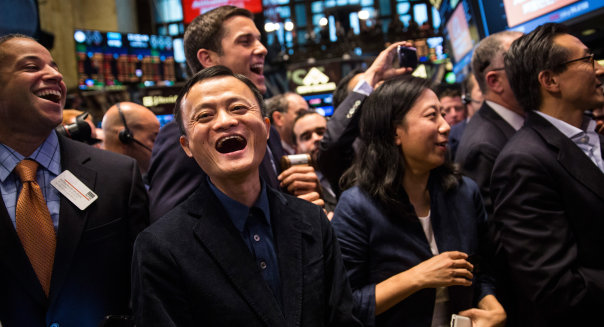
I was inundated with emails last week asking if I had any special connections. I’m certainly not the go-to-gal when it comes to sold-out tickets to concerts or sporting events, but it seems I’m top of mind when friends and acquaintances want to get in on an initial public offering. It happened with Facebook (FB), then Twitter (TWTR), and most recently, Alibaba (BABA).
Despite my being nothing more than a financial adviser at a boutique money management firm in southern California, within my professional, athletic and social circles, people conclude I’m the closest thing they know to a Wall Street investment banker and underwriter. “Sorry,” I told them, “you’ll have to wait until Friday, when shares are available to the public.”
For the vast majority of initial public offerings, the ordinary investor has no shot of purchasing shares at the offering price. For some IPOs, that might be a good thing. Facebook is a famous example of a stock where average investors — had they waited a day or two — were able to buy shares at a substantial discount from the price that underwriters made available to their preferred clients.
But that was not the case with Alibaba. The stock price opened at $92.70, an impressive 36 percent above the $68 initial offering price and closed the day at $93.89, giving the company a market value of $231 billion, about the size of behemoths Procter and Gamble (PG) and JPMorgan Chase (JPM). That’s bigger than e-commerce companies eBay (EBAY) and Amazon (AMZN) combined.
Investors who didn’t get in on the early action are now wondering if they should shell out more than $90 a share to get a piece of the largest-ever IPO.
I’m not sure if his man-crush on Alibaba founder Jack Ma has any impact, but Jim Cramer doesn’t think the company is particularly overvalued. Cramer on Saturday blogged, “Ultimately, though, if there is a swoon, and you can get the shares of this fast-growing, large-capitalization company at a market multiple (back in the mid-’80s), then I think you should do it. I believe in the company. I believe in the man.” He does add, however, that he prefers “both Facebook and Google” (GOOG) to Alibaba.
The Case for the Bulls
Profitability. Alibaba is profitable. The company had $8.5 billion in sales in its latest fiscal year ending in March, with net income of $3.8 billion.
Growth. According to a July report by the McKinsey Global Institute, only 46 percent of China’s consumers have access to the Internet, compared with 87 percent in the U.S. Despite the lack of Internet penetration, 632 million Chinese use the Internet, compared to 277 million in the U.S. There are 700 million activated smart devices in the country, and in 2013 Internet sales exceeded the equivalent of $300 billion. In a country that never developed a bricks-and-mortar mall infrastructure, Chinese Internet retailers have a captive — and growing — customer base. Growth potential isn’t limited to only China; Ma has made no secret about his intentions to compete in foreign markets, including the U.S.
Market share. Alibaba is responsible for more than 80 percent of all online sales in China.
And to think that Ma, a former English teacher, started the company in his small apartment a mere 15 years ago. No wonder investors bid the share price up so high on Friday.
The Case for the Bears
Seasoned investors understand that no reward can be captured without taking risk. And Alibaba investors face many.
Corporate governance. Alibaba shareholders have limited rights and don’t control the company due to Alibaba’s unusual corporate governance structure. This “partnership” is empowered with granting board seats to nominees without shareholder approval. Also, shareholders don’t hold interest in the company directly. Since Chinese law severely restricts foreign ownership, shareholders actually own interest in an entity that is registered in the Cayman Islands that is under contract to receive the profits from Alibaba’s Chinese assets. This is similar to how Baidu (BIDU), China’s dominant search engine provider, is structured.
Political environment. China is ruled by the Communist Party. Although the government has engaged in significant economic and market reforms over the past two decades, it still operates with a large degree of control over private enterprise. That risk, however, is not unique to Alibaba investors.
History. According to Jay Ritter, a finance professor at the University of Florida, Chinese companies that have gone public in the U.S. have, on average, underperformed the U.S. market by about 9 percent per year in the three years after the IPO.
Investors who believe the stock is overpriced at the level of Friday’s close will have an opportunity to obtain stock at a discount by using options when U.S. options exchanges begin to list contracts on the company, which is expected to begin in about two weeks. I anticipate that one of the most popular strategies will be writing covered calls — where an investor purchases 100 shares of stock at the market price, sells a call option and receives call option premium for agreeing to sell the shares at a certain price in the future. The premium received will partially offset the price the investor paid for the shares, effectively providing a discount from the market price of the stock.
•Is Your Financial Adviser Profiting At Your Expense?
•Easy, Last-Minute Move Could Cut Your Taxes by Thousands
•Spousal IRA Lets Nonworking Spouse Save for Retirement


Leave a Reply